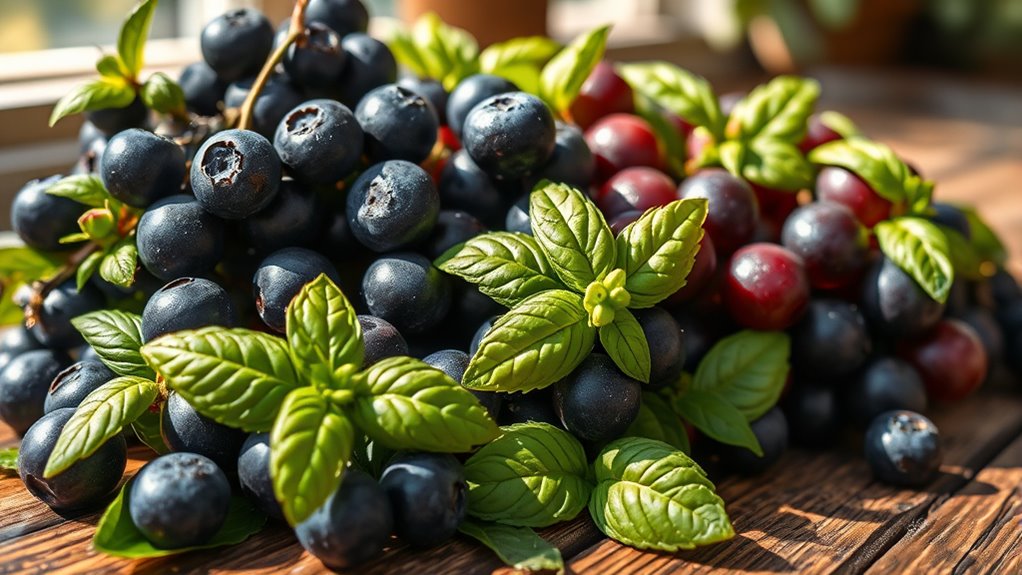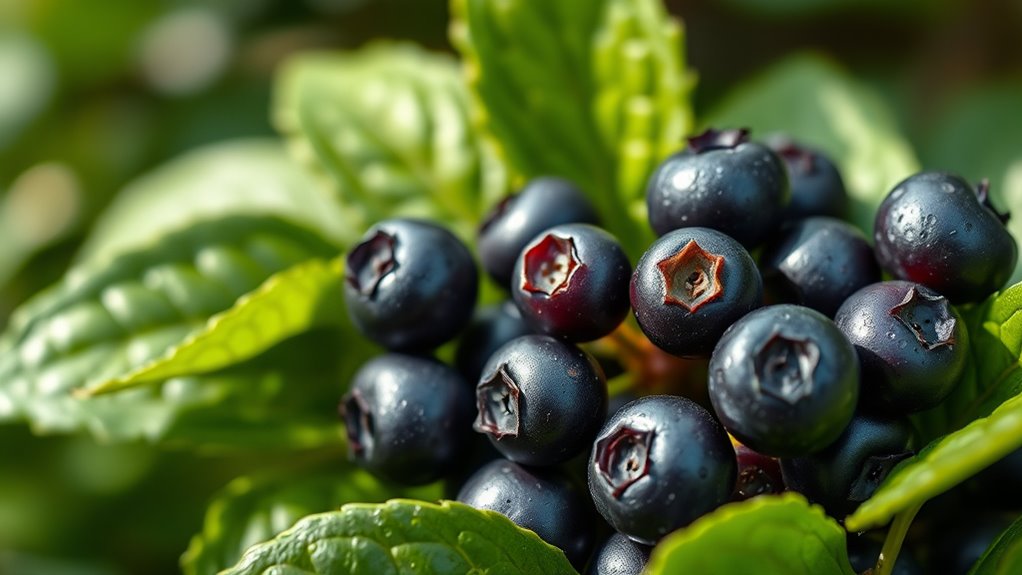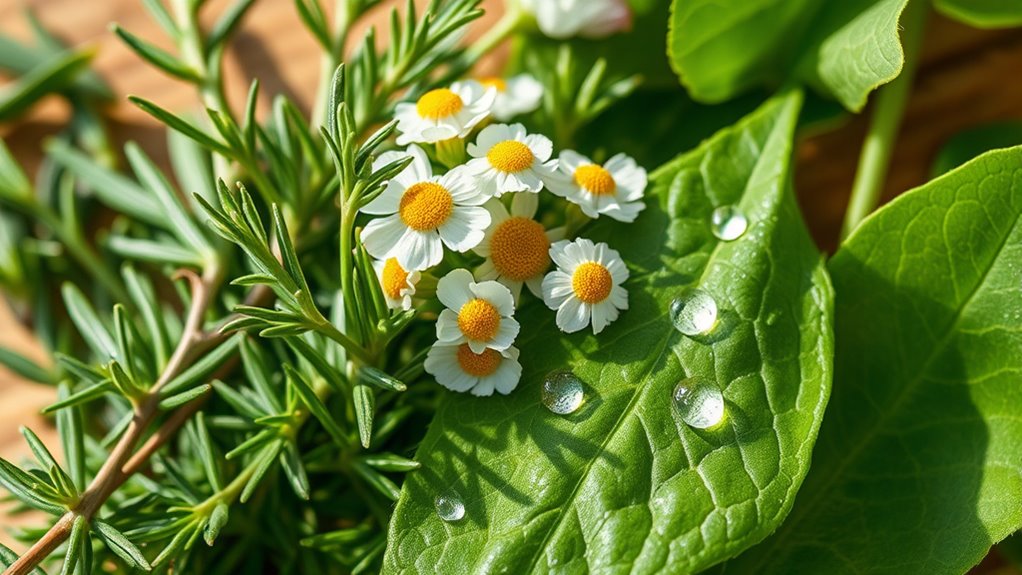To support your vision longevity as you age, incorporate herbs rich in antioxidants like bilberry and carotenoids such as lutein and zeaxanthin, which protect your eyes from UV damage and oxidative stress. Support night vision with bilberry and improve circulation with ginkgo biloba. Herbs like eyebright, turmeric, and licorice soothe eye irritation, while gotu kola strengthens tissues. Combining these herbal allies into your routine can help maintain eye health and clarity for years to come.
Key Takeaways
- Antioxidant-rich herbs like bilberry, ginkgo, and turmeric protect eye cells from oxidative damage and support long-term retinal health.
- Carotenoid herbs and foods filter blue light and strengthen vision, reducing age-related decline and sun damage.
- Herbal supports such as bilberry and ginkgo improve circulation, night vision, and reduce eye fatigue.
- Topical herbal infusions and compresses soothe irritated eyes, reduce inflammation, and enhance eye comfort.
- Consistent herbal routines combined with proper diet and eye care promote vision longevity and healthy aging eyes.
The Role of Antioxidants in Protecting Eye Health

Antioxidants play a crucial role in safeguarding your eye health as you age. They neutralize free radicals, unstable molecules that can damage your eye cells and accelerate age-related issues like cataracts and macular degeneration. By reducing oxidative stress, antioxidants help maintain the clarity and function of your vision. Nutrients such as vitamins C and E, along with carotenoids like lutein and zeaxanthin, are powerful antioxidants found in various herbs and foods. Consuming these regularly supports your retinal health and protects your eyes from damage caused by environmental factors, like UV rays and pollution. Incorporating antioxidant-rich herbs into your diet is a simple yet effective way to promote long-term eye health and preserve your vision as you age.
Bilberry: A Berry for Better Night Vision

Bilberries are packed with antioxidants that support your retina and help protect your eye health. They’re especially known for enhancing night vision, making it easier to see in low light. Rich in anthocyanins, these berries boost your eye’s resilience and clarity.
Antioxidants Supporting Retina
Since your eyes are constantly exposed to environmental stressors like pollution and UV rays, supporting your retina with powerful antioxidants can make a significant difference. These nutrients help neutralize free radicals that damage retinal cells over time. Vitamins C and E are key antioxidants that protect against oxidative stress, preserving your visual function. Lutein and zeaxanthin are carotenoids found in the retina, filtering harmful blue light and reducing oxidative damage. Incorporating foods rich in these antioxidants, such as leafy greens, nuts, and colorful berries, can strengthen your retinal health. Supplementing with targeted antioxidants may also enhance your eye resilience as you age. Protecting your retina with these natural allies helps maintain clearer vision and reduces age-related degeneration.
Enhances Night Vision
If you struggle with seeing clearly in low-light conditions, incorporating bilberry into your diet might help improve your night vision. Bilberries contain compounds that strengthen the tiny blood vessels in your eyes, especially those involved in adapting to darkness. They also support the production of rhodopsin, a pigment essential for low-light vision. Regular consumption of bilberries or their extracts can lead to sharper night vision and quicker adaptation after exposure to bright lights. You might notice improved clarity when driving at night or walking in dim environments. While individual results vary, including bilberries as part of your eye health routine offers a natural way to enhance your ability to see in darkness. Make them a regular snack or supplement for better night vision support.
Rich in Anthocyanins
Building on the benefits for night vision, the powerful compounds in bilberries—particularly anthocyanins—play a key role in supporting your eye health. These antioxidants help protect your eyes from oxidative stress, which can contribute to aging and vision decline. Anthocyanins also improve blood circulation to your retinal vessels, ensuring essential nutrients reach your eyes. Regularly consuming bilberries may reduce the risk of age-related macular degeneration and cataracts. Plus, their anti-inflammatory properties can soothe irritated eyes and preserve visual clarity. Incorporating bilberries into your diet or supplements offers a natural way to bolster your eye resilience over time.
- Protects against oxidative damage
- Enhances retinal health
- Promotes better circulation
- Supports long-term vision preservation
Ginkgo Biloba and Circulation Support for the Eyes

Ginkgo biloba has long been valued for its ability to enhance blood flow, making it a popular natural remedy for supporting eye health. By improving circulation, it helps deliver essential nutrients and oxygen to the delicate tissues in your eyes. This increased blood flow can reduce poor circulation-related issues like eye fatigue and vision fluctuations. Ginkgo contains flavonoids and terpenoids, which strengthen blood vessels and improve their flexibility. Regular use may also help protect your eyes from oxidative stress caused by free radicals. While it’s not a cure-all, incorporating ginkgo biloba into your routine can support overall eye health and robustness. Just be sure to consult your healthcare provider before starting supplements, especially if you’re on blood thinners or other medications.
Eyebright: Traditional Herb for Eye Comfort

Eyebright has been celebrated for centuries as a natural remedy to soothe irritated eyes and promote comfort. You may find it helpful if your eyes feel tired, dry, or inflamed. Traditionally, it’s used in eye washes, teas, or supplements to support eye health. Its gentle anti-inflammatory properties help reduce redness and irritation, making your eyes feel refreshed. Incorporating eyebright into your routine can provide relief without harsh chemicals. Keep in mind, consistency is key for noticeable benefits. Remember, eyebright works best as part of a holistic approach to eye health. By choosing natural options like this herb, you’re nurturing your vision over time. It’s a simple yet effective way to care for your aging eyes naturally and gently.
Turmeric and Curcumin for Reducing Inflammation

Turmeric and its active compound, curcumin, are powerful natural anti-inflammatories that can help reduce eye inflammation and discomfort. When inflammation causes redness, irritation, or swelling, incorporating turmeric into your diet or supplements may offer relief. Curcumin works by blocking inflammatory pathways in your body, helping to protect your eyes from chronic inflammation that can accelerate aging. To maximize benefits, consider adding turmeric to your meals or taking high-quality supplements with black pepper, which enhances absorption. Keep in mind that consistent use is key—results won’t happen overnight. While turmeric is generally safe, consult your healthcare provider before starting any new supplement, especially if you’re on medication. By reducing inflammation, you support healthier eyes and preserve your vision longer.
Chrysanthemum Tea: A Natural Remedy for Eye Strain

After reducing inflammation with turmeric, you might want to turn to a natural remedy that specifically targets eye strain—chrysanthemum tea. This herbal infusion has been used for centuries to soothe tired eyes and improve visual comfort. It contains antioxidants and anti-inflammatory compounds that help relax eye muscles and reduce redness. Drinking chrysanthemum tea regularly can support your eye health by calming irritation caused by prolonged screen time or fatigue. It’s gentle, invigorating, and easy to incorporate into your daily routine. Remember, consistent use enhances its benefits and promotes long-term eye comfort.
- Contains antioxidants that combat oxidative stress
- Helps reduce redness and eye fatigue
- Supports relaxation of strained eye muscles
- Offers a calming effect for overall eye comfort
Licorice Root and Its Eye-Soothing Properties

Licorice root has been prized for centuries for its natural anti-inflammatory and soothing properties, making it a valuable remedy for tired, irritated eyes. It contains compounds like glycyrrhizin that help reduce inflammation and calm eye redness. When used as an eye wash or in herbal eye compresses, licorice root can alleviate discomfort caused by dryness or environmental irritants. Its soothing effects may also protect delicate eye tissues from oxidative stress, promoting overall eye health. You can prepare a gentle infusion by steeping licorice root in hot water, then cooling it before applying it to your closed eyes. Regular use can help soothe tired eyes, reduce swelling, and support your eye’s natural resilience. Always consult a healthcare professional before incorporating herbal remedies into your routine.
Carotenoids: Lutein and Zeaxanthin for Visual Clarity

Carotenoids like lutein and zeaxanthin play a vital role in maintaining your eye health by filtering harmful high-energy light and protecting your retina from oxidative damage. These antioxidants accumulate in your macula, supporting sharp vision and reducing age-related decline. Incorporating foods rich in these carotenoids, such as leafy greens and colorful vegetables, can enhance your visual clarity over time. By doing so, you help shield your eyes from sun damage and oxidative stress, which are common causes of vision problems as you age.
- Support for healthy vision and contrast sensitivity
- Reduction of blue light damage from screens
- Lower risk of age-related macular degeneration
- Natural protection through dietary intake
The Benefits of Gotu Kola in Maintaining Eye Tissue Integrity

Building on the protective effects of carotenoids, herbal remedies like Gotu Kola have gained recognition for supporting eye tissue health. Gotu Kola is rich in triterpenoids, which boost collagen production and improve circulation. This enhances the strength and elasticity of the delicate tissues in your eyes, helping to prevent degeneration. Its anti-inflammatory properties reduce swelling and irritation, promoting overall eye comfort. By strengthening capillaries and connective tissues, Gotu Kola helps maintain the structural integrity necessary for clear vision. Regular use may slow age-related deterioration and support recovery from minor eye injuries. Incorporating Gotu Kola into your wellness routine can help preserve the resilience of your eye tissues, contributing to long-term eye health and clarity as you age.
Incorporating Herbal Allies Into Your Daily Routine

To effectively support your aging eyes, incorporating herbal allies into your daily routine is both simple and beneficial. Consistency is key; small daily habits can lead to lasting health improvements. Start by adding herbal teas like bilberry or chamomile, which promote eye health and reduce inflammation. Use herbal eye drops or compresses with soothing herbs such as eyebright. Incorporate supplements like lutein or zeaxanthin to strengthen your vision from within. Remember, integrating these herbs gradually helps your body adapt.
- Choose quality herbs and supplements to guarantee potency and safety.
- Combine internal and external methods for extensive support.
- Stay hydrated to enhance herbal efficacy and eye comfort.
- Consult a healthcare professional before starting new herbal routines.
Frequently Asked Questions
Are Herbal Supplements Safe for All Ages With Eye Issues?
Herbal supplements can be safe for many ages with eye issues, but you should always consult your healthcare provider first. Different herbs may suit different age groups and health conditions, so professional guidance guarantees you’re choosing the right ones. Pay attention to dosage and possible interactions with medications. When used properly, herbal allies can support your eye health safely and effectively as part of your overall wellness plan.
How Long Does It Take to See Improvements Using Herbal Eye Remedies?
You might start noticing improvements within a few weeks, but it often takes about 4 to 8 weeks of consistent use for herbal eye remedies to show noticeable results. Keep in mind, individual responses vary depending on your eye health and the herbs used. Stay patient and follow dosage instructions closely. Regularly consult your healthcare provider to monitor progress and make sure the remedies work effectively for you.
Can Herbal Allies Replace Conventional Eye Treatments Entirely?
Herbal allies can’t fully replace conventional eye treatments, but they’re like gentle rain nourishing your vision. While herbs support eye health and may slow age-related decline, they shouldn’t be your only defense against serious issues. You should consult with a healthcare professional for eye conditions that need medical attention. Using herbal remedies alongside traditional treatments can create a balanced approach, helping you maintain clearer, healthier vision over time.
Are There Any Known Interactions Between Herbal Herbs and Eye Medications?
Yes, some herbal herbs can communicate with eye medications. For example, ginkgo biloba may increase bleeding risk when combined with blood thinners, and St. John’s Wort can influence the metabolism of certain drugs. You should always consult your healthcare provider before combining herbs with eye medications, especially if you’re on prescription treatments, to avoid adverse interactions and ensure safe, effective care.
What Are the Recommended Dosages for Herbal Supplements for Eye Health?
Think of herbal supplements as tiny guardians for your eyes. For best results, follow standard dosages: bilberry extract at 80-160 mg daily, ginkgo biloba at 120-240 mg, and lutein around 10 mg per day. Always start low, and consult your healthcare provider before increasing doses, especially if you’re on medication. Proper dosing helps protect your vision and keeps those guardians strong.
Conclusion
Taking herbal allies like bilberry, ginkgo, and lutein can support your eye health as you age. Did you know that age-related macular degeneration affects over 196 million people worldwide? Incorporating these natural remedies into your daily routine might help preserve your vision and reduce the risk of eye issues. Stay proactive, nourish your eyes with herbal support, and enjoy clearer vision for years to come.










